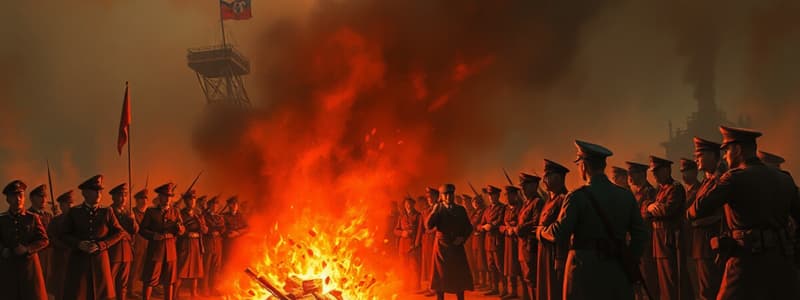Podcast
Questions and Answers
Critically evaluate to what extent the policy of appeasement was the predominant catalyst accelerating the commencement of WWII, considering alternative geopolitical factors influencing Hitler's strategic calculus.
Critically evaluate to what extent the policy of appeasement was the predominant catalyst accelerating the commencement of WWII, considering alternative geopolitical factors influencing Hitler's strategic calculus.
Appeasement significantly contributed to the acceleration of WWII by emboldening Hitler, but his pre-existing expansionist aims, as outlined in Mein Kampf and the Hossbach Memorandum, were primary drivers. The absence of opposition during events like Anschluss directly enabled Hitler's actions.
Analyze the counterfactual scenario in which Britain and France had adopted a firm stance against the remilitarization of the Rhineland. How might this have altered the trajectory of European geopolitics and Hitler's subsequent actions?
Analyze the counterfactual scenario in which Britain and France had adopted a firm stance against the remilitarization of the Rhineland. How might this have altered the trajectory of European geopolitics and Hitler's subsequent actions?
A firm stance against the Rhineland remilitarization might have deterred Hitler early, potentially preventing his later aggressive moves. It could have strengthened the resolve of smaller states and discouraged Italy and Japan, altering the balance of power and potentially delaying the war.
Deconstruct Ian Kershaw's assertion that 'Hitler did not have a blueprint for war and behaved much as any other German leader might have.' To what degree does this assessment align with or contradict historical evidence regarding Hitler's long-term strategic objectives?
Deconstruct Ian Kershaw's assertion that 'Hitler did not have a blueprint for war and behaved much as any other German leader might have.' To what degree does this assessment align with or contradict historical evidence regarding Hitler's long-term strategic objectives?
Kershaw's assertion is partially contradicted by Hitler's documented expansionist goals in Mein Kampf and the Hossbach Memorandum, which indicate a clear, if adaptable, strategic vision. While immediate actions may have resembled those of other German leaders, his overarching aims were distinctly radical and aggressive.
Assess the claim that appeasement was primarily a result of Britain's post-World War I economic and military weaknesses. Could a different domestic policy orientation in Britain have significantly altered its approach to European diplomacy during the 1930s?
Assess the claim that appeasement was primarily a result of Britain's post-World War I economic and military weaknesses. Could a different domestic policy orientation in Britain have significantly altered its approach to European diplomacy during the 1930s?
To what extent did the failure of the League of Nations to effectively address earlier instances of aggression, such as Japan's invasion of Manchuria and Italy's invasion of Abyssinia, contribute to the environment in which appeasement became a viable policy option for Britain and France?
To what extent did the failure of the League of Nations to effectively address earlier instances of aggression, such as Japan's invasion of Manchuria and Italy's invasion of Abyssinia, contribute to the environment in which appeasement became a viable policy option for Britain and France?
Critically evaluate the counterfactual scenario where Britain and France initiated a preemptive military intervention against Germany during the remilitarization of the Rhineland in 1936. Detail the potential ramifications for European geopolitics, considering factors such as domestic political stability in Britain and France, the Soviet Union's strategic positioning, and the prevailing economic conditions of the era.
Critically evaluate the counterfactual scenario where Britain and France initiated a preemptive military intervention against Germany during the remilitarization of the Rhineland in 1936. Detail the potential ramifications for European geopolitics, considering factors such as domestic political stability in Britain and France, the Soviet Union's strategic positioning, and the prevailing economic conditions of the era.
Analyze the multifaceted influence of prevailing economic conditions, specifically the reverberating effects of the Great Depression, on the formulation and execution of appeasement policies by Britain and France in the interwar period. How did economic vulnerabilities shape diplomatic strategies and military preparedness?
Analyze the multifaceted influence of prevailing economic conditions, specifically the reverberating effects of the Great Depression, on the formulation and execution of appeasement policies by Britain and France in the interwar period. How did economic vulnerabilities shape diplomatic strategies and military preparedness?
To what extent did the Munich Agreement serve as a critical inflection point in the progression of Nazi Germany's geopolitical ambitions? Elucidate its long-term implications regarding the credibility of international diplomacy and the collective security framework of the League of Nations.
To what extent did the Munich Agreement serve as a critical inflection point in the progression of Nazi Germany's geopolitical ambitions? Elucidate its long-term implications regarding the credibility of international diplomacy and the collective security framework of the League of Nations.
Assess the argument that the policy of appeasement was, in essence, a calculated strategy of 'buying time' to facilitate the rearmament efforts of Britain. Critically evaluate this perspective, considering empirical evidence of actual rearmament progress against the backdrop of escalating German aggression.
Assess the argument that the policy of appeasement was, in essence, a calculated strategy of 'buying time' to facilitate the rearmament efforts of Britain. Critically evaluate this perspective, considering empirical evidence of actual rearmament progress against the backdrop of escalating German aggression.
Deconstruct the thesis positing that the fear of communism was a significant driver behind the appeasement policies of Britain and France. How did anxieties regarding the potential expansion of Soviet influence shape their strategic calculus in dealing with Nazi Germany?
Deconstruct the thesis positing that the fear of communism was a significant driver behind the appeasement policies of Britain and France. How did anxieties regarding the potential expansion of Soviet influence shape their strategic calculus in dealing with Nazi Germany?
Discuss the internal inconsistencies within British and French political thought concerning appeasement. What were the key ideological fractures and oppositional viewpoints that challenged the prevailing policy, and how did these dissenting voices attempt to shape public discourse and governmental actions?
Discuss the internal inconsistencies within British and French political thought concerning appeasement. What were the key ideological fractures and oppositional viewpoints that challenged the prevailing policy, and how did these dissenting voices attempt to shape public discourse and governmental actions?
Analyze the extent to which the collective memory of World War I influenced public sentiment and governmental decision-making in Britain and France during the 1930s. How did the pervasive trauma shape the perception of potential future conflicts and the acceptability of diplomatic concessions?
Analyze the extent to which the collective memory of World War I influenced public sentiment and governmental decision-making in Britain and France during the 1930s. How did the pervasive trauma shape the perception of potential future conflicts and the acceptability of diplomatic concessions?
Critically assess the role of intelligence failures and miscalculations in shaping the appeasement policies. To what extent did inaccurate or incomplete information regarding Germany's military capabilities and strategic intentions contribute to the underestimation of Hitler's ambitions?
Critically assess the role of intelligence failures and miscalculations in shaping the appeasement policies. To what extent did inaccurate or incomplete information regarding Germany's military capabilities and strategic intentions contribute to the underestimation of Hitler's ambitions?
Flashcards
Rhineland Remilitarization (1936)
Rhineland Remilitarization (1936)
The remilitarization of the Rhineland boosted Hitler's confidence and power.
Appeasement's Impact on Smaller States
Appeasement's Impact on Smaller States
Appeasement eroded the trust smaller nations had in Britain and France's protection, leaving them vulnerable to aggression.
Appeasement & Other Aggressors
Appeasement & Other Aggressors
Seeing no consequences for Hitler's actions, Italy and Japan became more aggressive.
Mein Kampf
Mein Kampf
Signup and view all the flashcards
Lebensraum
Lebensraum
Signup and view all the flashcards
Appeasement
Appeasement
Signup and view all the flashcards
The Great Depression
The Great Depression
Signup and view all the flashcards
Underestimation of Hitler
Underestimation of Hitler
Signup and view all the flashcards
Fear of Communism
Fear of Communism
Signup and view all the flashcards
Strategic Delay
Strategic Delay
Signup and view all the flashcards
Remilitarization of the Rhineland
Remilitarization of the Rhineland
Signup and view all the flashcards
Anschluss with Austria
Anschluss with Austria
Signup and view all the flashcards
Munich Agreement (1938)
Munich Agreement (1938)
Signup and view all the flashcards
Study Notes
- The memories of World War I and economic instability led Britain and France to pursue appeasement to avoid another devastating conflict.
Reasons for Appeasement
- The devastation of World War I created a strong desire to avoid another large-scale conflict.
- The Great Depression weakened Britain and France, making military intervention costly and difficult.
- Governments faced domestic issues, making foreign conflicts less of a priority.
- Many leaders believed Hitler’s demands were limited and reasonable.
- Nazi Germany was seen as a buffer against the spread of communism from the Soviet Union.
- Britain and France were not fully prepared for war and needed time to rearm.
- The majority of the population was against another war, pressuring leaders to seek peaceful resolutions.
- Appeasement aimed to buy time for rearmament, despite temporary concessions to Germany.
- Britain and France were economically and militarily unprepared due to the Great Depression.
- There was strong resistance to another war following the devastation of WWI.
- Appeasement ultimately failed to prevent aggression, allowing Hitler to exploit diplomatic weaknesses.
- The desire for peace blinded Britain and France to the reality of Hitler’s ambitions, allowing him to push his agenda forward unchecked. - Martin Gilbert
Consequences of Appeasement
- Appeasement emboldened Hitler, allowing expansion and paving the way for further aggression.
- No action was taken by Britain or France when Germany remilitarized the Rhineland in 1936, despite clear Versailles Treaty violations.
- Germany annexed Austria in 1938 without facing opposition.
- The Sudetenland was handed to Germany without Czech consent in the 1938 Munich Agreement reinforcing Hitler's belief in avoiding confrontation.
- The collapse of Czechoslovakia in 1939 demonstrated that Hitler would not stop after gaining the Sudetenland.
- The invasion of Poland in 1939 was the final step that forced Britain and France to declare war on Germany.
- The appeasers made Hitler’s expansion possible by consistently underestimating his ambitions and overestimating their ability to control him. – A.J.P. Taylor
- The remilitarization of the Rhineland in 1936 allowed Hitler to gain confidence due to Britain’s passive acceptance.
- Appeasement weakened faith in Britain and France as protectors, leaving countries like Poland vulnerable, undermining smaller states
- Italy and Japan pursued more aggressive policies after seeing the lack of consequences for Hitler, encouraging other aggressors
- Appeasement accelerated the path to war by empowering Hitler and encouraging other aggressive regimes, although it was intended to preserve peace.
Hitler's Ambitions
- Hitler’s ambitions were the driving force behind the outbreak of the war, and appeasement was just a contributing factor.
- Hitler’s foreign policy outlined clear expansionist goals that existed independently of appeasement in Mein Kampf and the Hossbach Memorandum.
- Hitler was determined to expand eastward regardless of diplomatic negotiations for Lebensraum (Living Space)
- Hitler initially failed to annex Austria due to external intervention, but once Italy did not intervene, he succeeded, with the Anschluss as an example.
- Without appeasement, Hitler would have faced resistance much earlier, potentially altering his ability to act, as appeasement allowed the execution.
- Hitler did not have a blueprint for war and behaved much as any other German leader might have. – Ian Kershaw
- Hitler’s aims were clear from the very beginning, and his actions were not dictated by appeasement.
- His success was directly enabled by the lack of opposition from other powers, as seen in cases like the Anschluss
Studying That Suits You
Use AI to generate personalized quizzes and flashcards to suit your learning preferences.
Description
Explore the reasons behind Britain and France's policy of appeasement towards Nazi Germany in the lead up to World War II. This policy was influenced by the memories of World War I, economic instability, and a desire to avoid conflict. Leaders hoped to prevent war but inadvertently enabled Hitler's aggression.





